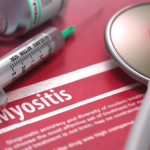However, some researchers argue that the distinction between MSAs and MAAs may not be a valuable one, because some patients positive for MSAs never actually develop myositis. Some have even suggested replacing these terms with more general terms, such as CTD-myositis overlap or interstitial lung disease (ILD) autoantibodies, to emphasize the fact that these autoantibodies can present in a number of different clinical settings.3
Myositis-correlated autoantibodies (including MSAs and MAAs) are detected in about 80% of myositis patients.7 This number, however, may not reflect the true percentage of these patients with positive autoantibodies, because new autoantibodies continue to be discovered. More than 20 such MSAs and MAAs have been described.3
The pathophysiology of these autoantibodies is still uncertain, because scientists do not understand the full etiology of these conditions.8 These autoantibodies target ubiquitous intracellular antigens, and it is unclear why these autoantibodies would be associated with predominantly muscular symptoms. It is not known whether these autoantibodies play a role in the etiology of these diseases or whether they may simply serve as helpful disease markers.5
Rohit Aggarwal, MD, MS, is the medical director of the Arthritis and Autoimmunity Center, associate professor of medicine and co-director of the UPMC Myositis Center at the University of Pittsburgh. He explains, “These autoantibodies may be a silent bystander in some cases, but in some cases, evidence suggests these autoantibodies may be playing an active role in the pathogenesis of myositis. For example anti-synthetase antibodies, especially anti-Jo-1 antibodies, have been linked with pathogenesis.”
MSAs’ Clinical Impact
The following is a non-comprehensive sampling of relevant information about MSAs in IIM.
Anti-Aminoacyl-tRNA Synthetase Autoantibodies (Anti-ARS Antibodies)
This group of antibodies is the most common group as a whole. It includes the most commonly found MSA, the anti-Jo autoantibody, which targets a specific aminoacyl-tRNA synthetase used during protein synthesis. To date, eight such autoantibodies have been described, and more may be found in the future targeting the other known versions of the aminoacyl-tRNA synthetase enzyme.2,3
Patients with anti-ARS antibodies may have anti-synthetase syndrome, characterized by muscle symptoms, interstitial lung disease, joint involvement, “mechanic’s hand,” fever and Raynaud symptoms.

Dr. Gunawardena
Dr. Gunawardena explains, “Some patients can present or develop all manifestations. Some patients have just a few (e.g., in lung-dominant anti-synthetase syndrome) and never develop myositis. Regardless of the anti-synthetase autoantibody subtype, if we see a patient with CTD-myositis overlap and they test positive for anti-synthetase, this indicates a higher risk of interstitial lung disease.”


